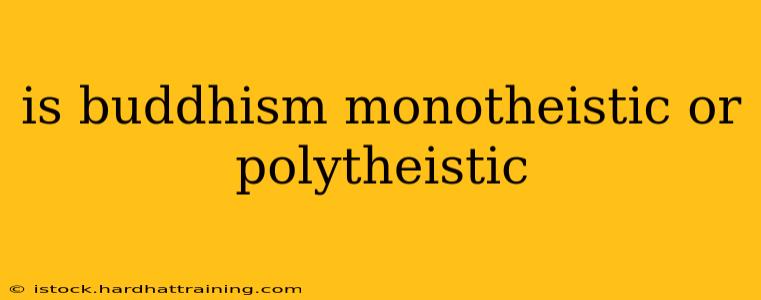The question of whether Buddhism is monotheistic or polytheistic often leads to confusion. The answer isn't a simple "yes" or "no," as Buddhism's relationship with deities differs significantly from that of traditional monotheistic or polytheistic religions. Understanding this requires exploring the core tenets of Buddhism and its approach to spiritual figures.
The Absence of a Creator God
Unlike monotheistic religions like Christianity or Islam, Buddhism does not posit a single, all-powerful creator god who governs the universe and judges humanity. There's no divine being responsible for creation or the establishment of moral laws. This absence of a central creator figure is a key distinguishing feature.
The Role of Deities in Buddhist Traditions
While Buddhism doesn't center on a creator god, various deities and spiritual beings exist within Buddhist cosmology. These figures, often originating from pre-existing Hindu or indigenous belief systems, are incorporated into various Buddhist traditions, particularly in Mahayana Buddhism. Examples include:
- Buddha himself: While revered as enlightened, Buddha is not considered a god in the traditional sense. He's a human who achieved enlightenment through his own efforts and teachings, demonstrating a path others can follow.
- Bodhisattvas: These enlightened beings postpone their own nirvana to help others achieve enlightenment. Figures like Avalokiteshvara (Guanyin) and Manjushri are widely revered and worshipped, receiving offerings and prayers.
- Devas and other celestial beings: Buddhist cosmology includes a vast array of gods, spirits, and other supernatural entities inhabiting different realms. These beings are not considered ultimate authorities but rather part of the cyclical nature of samsara (the cycle of birth, death, and rebirth).
The Focus on Personal Enlightenment
The core of Buddhist practice centers on personal enlightenment, achieving nirvana (liberation from suffering) through practices like meditation, mindfulness, and ethical conduct. This emphasis on individual spiritual growth differs greatly from religions focused on devotion to a supreme deity. Deities, when incorporated, are seen as aids on the path to enlightenment, not as objects of ultimate worship or salvation.
A nuanced perspective: Neither Monotheistic nor Polytheistic
Therefore, classifying Buddhism as strictly monotheistic or polytheistic is inaccurate. It's more accurate to say that Buddhism occupies a unique space. Its focus on personal spiritual development and the absence of a creator god distinguish it from traditional monotheistic religions. The presence of various deities and spiritual beings, however, doesn't make it polytheistic in the same way as ancient Greek or Roman religions, as these deities don't hold the same level of supreme authority.
The varied interpretations and practices across different Buddhist traditions further complicate a simple classification. While some traditions emphasize deity worship, others largely disregard it, focusing solely on the Buddha's teachings and practices. Understanding this nuanced approach is key to grasping Buddhism's unique place within the spectrum of world religions.
